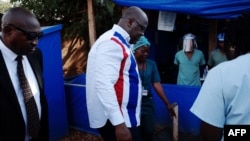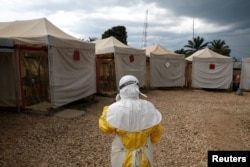Congolese President Felix Tshisekedi on Tuesday implored people in areas hit by the nation's worst-ever Ebola outbreak to accept the disease is real and trust health workers.
Mistrust of first responders and widespread misinformation propagated by some community leaders has led many in affected areas of eastern Democratic Republic of Congo to refuse vaccinations. Instead, they turn to traditional healers, whose clinics have contributed to the hemorrhagic fever's spread.
"It is not an imaginary disease," Tshisekedi said after arriving in the city of Beni on his first tour of eastern Congo since being inaugurated in January.
"If we follow the instructions, in two or three months Ebola will be finished," he optimistically told a crowd after having his temperature taken and washing his hands, as required of all incoming passengers to Beni airport.
Congo has suffered 10 outbreaks of Ebola, which causes severe vomiting, diarrhea and bleeding, since the virus was discovered there in 1976. The current one has seen 1,264 confirmed and probable cases and 814 deaths since it was declared last August.
It is surpassed only by the 2013-2016 outbreak in West Africa, in which more than 28,000 cases were reported and more than 11,000 people died.
Following a series of attacks on treatment centers by unidentified assailants in February and March, the current outbreak is now spreading at its fastest rate yet.
More than 100 cases were confirmed last week.
Tshisekedi, who won a disputed election last December to succeed Joseph Kabila, also called on Tuesday for the disarmament of dozens of militia that operate in the east and whose presence has complicated the Ebola response.
"The time of armed groups is over," he said. "The new government is reaching out to these children of the country to surrender arms through disarmament programs."






